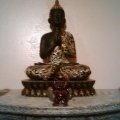Meditations on renouncing
 Jeroen
Luminous beings are we, not this crude matterNetherlands Veteran
Jeroen
Luminous beings are we, not this crude matterNetherlands Veteran
I wanted to talk a little more about renunciation and my family’s history with Osho. When I was seven, my mother and father and me got on a plane to India to see Bhagwan Shree Rajneesh, as he was then known. We were walking around in orange clothes, with mala’s around our necks, when we went to see him with the three of us at a public darshan. It was a lovely three months, I spent much time in the gardens of the ashram climbing trees and reading my stack of comic books.
It was an interesting time. My father and mother ran a meditation centre for a while, and eventually separated. My father gave up his job, and we joined a commune in the forests in the heart of the Netherlands. It was a radical step at the time, leaving all ambition and worldly possessions behind. I think I had two small suitcases, one with toys and one with clothes, and that was it. My father had trained as a software engineer at a Technical University here, so he had a decent job within the commune and options outside it if he wanted to leave.
But we ended up going to Bhagwan’s commune in the United States, emigrating was an entirely different experience I have to say. For a while we lived in rooms in shared houses with other sannyasins, but we still wore the orange, even in schools before we got to the commune. For the actual commune experience in the US, I was 13 at the time, but already pretty self reliant. I remember going to school half days, and working part of the day answering phones and stuff. There weren’t many luxuries that we could afford, so we lived modestly within the commune system.
We weren’t quite true renunciates in the Hindu sannyasin style. There was plenty of sex in the commune, everyone had a little cabin to sleep in, and we didn’t have time to sit by the river and contemplate. Commune life includes a lot of hard work, but you did get to leave behind a lot of other things like a lot of personal possessions — cars for instance were nearly all owned by the commune — there were free bus rides, there was a shared free library, you could pick up new clothes if you needed them for free, it was a whole new way of living.
So I would argue that for my father and mother it was a way of renouncing, breaking with the larger world, getting away from the stifling christianity in the Netherlands. I just kind of grew up in this, in a deeply spiritual surrounding.




Comments
The thing that I find interesting is that so many people in the 60’s, 70’s and 80’s followed Timothy Leary’s dictum to ‘tune in, turn on and drop out’. A lot of these flower power hippies were in a way renouncing the old world, and it was a very powerful leaning with a lot to say. They weren’t of course classic spiritual renunciates, but a lot of them were looking for love and peace, which are beautiful goals, and to pursue that while turning your back on the old world is great.
The fact that a lot of these hippies became Osho’s sannyasins — the movement had an estimated headcount of about 500,000 at its peak — and truly became spiritual disciples, is pretty cool.
I think in a way I never fully integrated my sannyasin childhood with later life. I lived a pretty ordinary life from about age 16 up until age 39, going to university, doing replacement National service as a conscientious objector, working as a graphic designer and later as a software engineer. Basically i shelved the spiritual life and acquired a new perspective as a “normal”. It was not until I had my breakdown that i started listening to Osho discourses again, and slowly deepened my understanding of what Osho’s teaching was all about, and that led to my long study of Buddhism.
It was really while studying Buddhism that I came to a deeper understanding of what it meant to lead an examined life, a life where you are actually conscious of what you do and examine the effects of your actions. I think I have Thich Nhat Hanh and his strong emphasis on mindfulness to thank for that. It’s certainly something that I would advise people to do, to study mindfulness and undertake its practice, seriously bringing it into your daily life.
Buddhism also has a lot of surfaces with renouncing. This applies mostly to the lives of the monks, and not really the lay people. It’s something i have considered, but I thought the cost to be too great, to have to pursue a monastic program under the control of those more senior rather than to have freedom to do as I see fit.
I find the way of the Hindu sannyasins very beautiful as well. That life has four stages, from the student Brahmacharya, to the householder Grihastha, to the hermit Vanaprastha, to the wandering sage Sannyasin. That shows a natural life path towards renouncing and letting go late in life, which to me is a sensible way of acknowledging ahead of time that you can’t take anything with you when death comes.
The thing is, it is not so easy to let go of things. I see this in my uncle, who a couple of years ago was told that he didn’t have much longer to live, and who has been getting steadily more unwell and is having the most difficulty with letting go of his family. The Hindu stages have fallen somewhat out of favour, in a lot of cases people get stuck at the householder stage and the spiritual awareness does not take root. And then death eventually comes as a shock.
But many Osho sannyasins have started earlier in life on renouncing. Renouncing houses, cars, careers, status, ambitions, goals and often family as well, that is a lot to let go of. If you can let all that go in your thirties, it sets you on a certain path.
The word ashram usually means ‘place of austerity’, and in some ways even Osho’s Poona ashram with its beautiful marble paths and gardens was that. It was a place where you left your past behind, took on a new name and took initiation.
A wandering Hindu sannyasin learning scripture.
A lot of my middle childhood years, from about 8 to about 16, were made up out of moving house often. I count 13 house moves in those eight years, going through my memories. It teaches you certain things, a life of wandering like that. It is a deep lesson in impermanence, both of your surroundings and your possessions. It teaches you to live lightly, not to acquire lots of heavy things which you are only going to have to leave behind again.
In terms of social circles too it teaches you things, but I am not sure I learnt the right lessons there. I got tired of making lots of new friends and then leaving them behind again, and instead ended up making just two or three close friends whenever I moved. It left my social circles somewhat small at times.
I find this interesting because for a long while I got hooked on watching OSHO's videos on youtube.